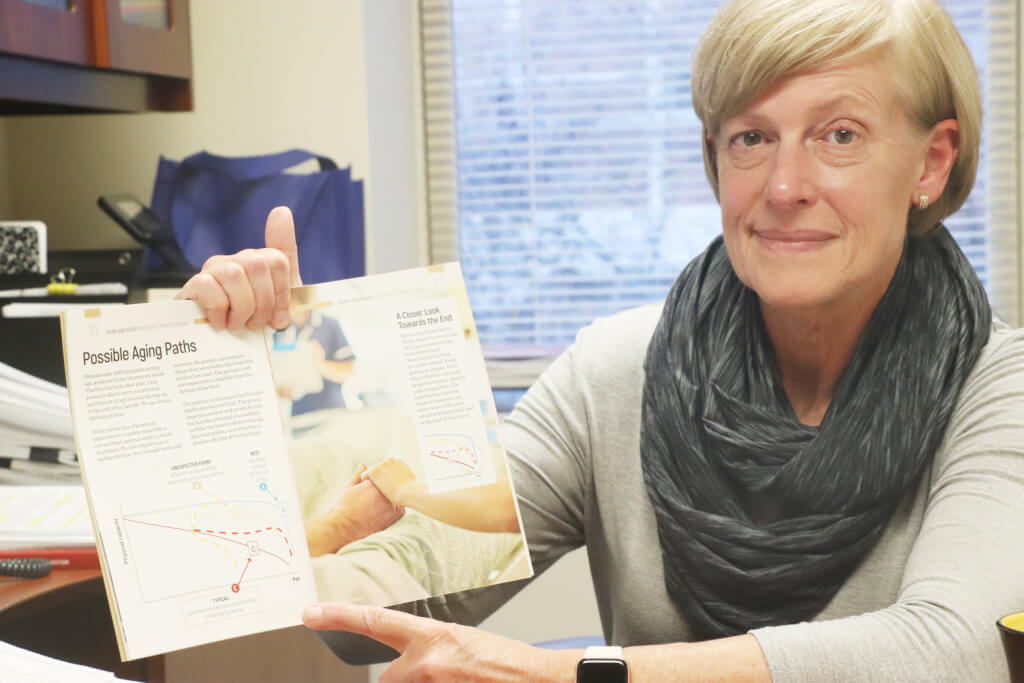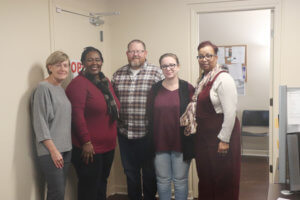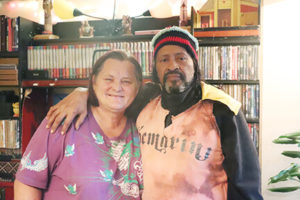by Peter White. This article originally appeared in the Tennessee Tribune.

Cathy Maxwell, PhD points to what happens to the lucky in the blue line (A), what happens to most people in the red line (C), and the yellow line (B) is what happens to people over 50 who suffer some serious injury. The good news is the red dotted line. It’s what happens when people take action to lift their lifeline curve higher.
A Vanderbilt researcher has taken just about everything you need to know about living well as you age and condensed it into a 36-page pamphlet called “Aging & Injury.” It is a good read, practical, and thorough.
Cathy Maxwell was a bedside nurse for more than 20 years in critical care and trauma. She saw a lot of elderly patients come to the emergency room from falls or car accidents.
“I see these patients come in from an injury and the outcomes of the older patients compared to the younger patients was so different,” Maxwell said. She wanted to find out why.
Luckily for Maxwell, the Vanderbilt Medical Center is just up the block from the School of Nursing where she teaches. It has a busy ER. That’s where Maxwell found the 188 subjects for her 2014 study.

Researcher Dr. Cathy Maxwell and the housing staff at Village on the Green, a low-income
affordable housing complex in North Nashville. From l-r; Cathy Maxwell, Lisa Marshall,
Bobby Shands, Stephanie Baugh, and Teresa Burns
Six research assistants questioned patients, their families, and their friends to find out what shape the patients were in just before they ended up in the ER. They asked them questions like: did they tire easily? Could they walk a city block or up a flight of stairs? Had they lost a lot of weight in the last year?
With that baseline data in hand, the researchers followed them for a year. They called them at 3 months, 6 months, and 12 months and asked them the same questions. Some got back to their initial baseline, 40% were readmitted to the hospital, and 25% had died within one year.
“It was their pre-injury frailty status that was the primary predictor of all three of those outcomes,” said Maxwell.
She compared patients who were already frail with those who weren’t. Four out of ten who were frail before their injury died within one year and only 2 out of 10 got back to the baseline. More than half non-frail subjects who had no physical impairment before their injury made it back to their baseline.
“This concept of frailty is a big deal. It’s happening [to] all of us as we age, but very few people have any idea what it is. It has been my mission help people understand and increase awareness about this process of frailty and that’s what this is all about,” she said.
Research shows that after 30, you start losing vitality. That has to do with the body’s ability to manufacture mitochondria, microscopic engines that make the body’s energy. Without them you die. And if you don’t maintain them, you lose them. So lifestyle changes to build your energy will keep you from getting frail sooner rather than later.
Maxwell explains it all on page 16 of her pamphlet. It’s a graph of sloping lines that converge at the end of life. It’s grim news for those who are already past the point of recovery. But [it] can be a wake-up call for those who aren’t.
You can live a long life until the inevitable comes, as it will to all of us, but death can come rather quickly at the end and Maxwell says a person can live quite well until then.
After Maxwell collected the content she developed the booklet. Then she tested it out at 16 different sites in the community. She did PowerPoint presentations at senior centers, churches, the YMCA, and low-income housing projects. She passed out questionnaires to find out what information motivates people to change their daily routines.
The section on energy and mitochondria got the most reaction. “When we explain that to them, something clicks,” Maxwell says. She said changes have been going on long before they are manifested in having more difficulty with activities of daily living.
Maxwell partnered with the Woodbine Community Organization, a nonprofit organization that owns some low-income housing in North Nashville. Two of Maxwell’s student researchers discussed the pamphlet with 20 of Woodbine’s senior residents and recorded their conversations.
Lisa Marshall manages the 120-unit complex. Technically, Marshall is the landlord, but she and her staff are the family many of their elderly tenants don’t have.
“We’re looking at their housing but that’s only a slice of their whole life. There’s their health or wellness, their family, their finances. This study actually helped us to have a closer relationship so the residents know we really care about them,” said Marshall.

Archie and Linda Souter have been married 15 years. Around the kitchen table, they talked about what will happen when one of them dies.
Linda and Archie Souter live in the Woodbine housing complex and participated in Maxwell’s second study.
“What got to us is that she came and asked us if we had a living will. Did we have a trust fund? Where were we in our thinking when planning for the end of life,” said Mrs. Souter.
“I’ve always said I’d like to go before she does. She would always say ‘don’t say that’. You discuss this with your mate and you say what you’re going to say, then you can take some personal time to think about yourself. How would I be or how would this be? You can go from there. It’s something to really look into,” said Mr. Souter.
The Souters confirmed what Maxwell has long thought. She doesn’t want her research to sit on a shelf somewhere in the Vanderbilt library. She wants to connect it with people who can use it.
Maxwell’s next study will also be with a low-income housing non-profit, Urban Housing Solutions. When the senior residence is finished, Maxwell plans to offer a ten-week wellness program for the tenants. They will each have a student coach from Vanderbilt School of Nursing or Tennessee State University’s Urban Studies program. They will help seniors make an action plan based on Maxwell’s pamphlet and help them carry it out.
Copies of Maxwell’s pamphlet can be obtained by emailing her here: cathy.maxwell@vanderbilt.edu
This article was written with the support of a journalism fellowship from the Gerontological Society of America, Journalists Network on Generations and the Retirement Research Foundation.
The opinions expressed in this article are those of the author and do not necessarily reflect those of the Diverse Elders Coalition.
